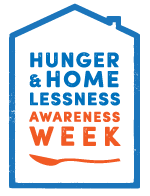Each year, we choose to highlight one poverty-related advocacy issue during Hunger and Homelessness Awareness Week. This year, we are focusing on the criminalization of homelessness.
Across the country, cities are criminalizing homelessness by making it illegal for people to sit, sleep, and even eat in public places – despite the absence of available housing, shelter, and other basic resources. These laws and policies violate the constitutional rights of the homeless and burden them with arrest records, fines, and fees, all of which stand in the way of homeless peoples’ ability to get jobs or housing.
These laws do not work to end homelessness. The evidence is clear that homelessness is reduced in communities that focus on housing, rather than on criminalization. In addition, the criminalization of homelessness costs more money than simply solving the problem by ensuring access to adequate housing.
During your Hunger and Homelessness Awareness Week, one way to incorporate this issue is by holding a sleepout. The National Coalition for the Homeless estimates that there are more than 564,000 people experiencing homelessness in the United States on a typical night, but there are only 426,000 shelter beds available – this leaves 25% of homeless people with no shelter. As a result, encampments (also known as “tent cities”) have been popping up on sidewalks and in city parks. Instead of providing more shelter space or affordable housing, many cities have responded by outlawing these tent cities. A sleepout is a great way to draw attention to these issues.
Another way you can address criminalization is by looking up the local food sharing laws in your community and speaking out against any policies that punish the homeless. Just like tent cities, sharing food in a public space with people experiencing homelessness has become illegal in many locations. Cities have ostensibly passed these laws out of concern over health code violations, but in truth they are primarily acting to quiet public complaints about homeless people in their neighborhoods. Either way the end result is to leave many homeless people without access to safe food.
If the criminalization of homelessness is of concern to you and is taking place in your community, please consider speaking out during your Awareness Week about the many ways that this course of action is counterproductive to ending homelessness.
